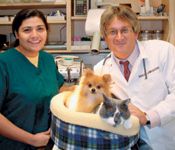Editors' Note: Picking up where your schooling may have left off
When you were in veterinary school, how many hours did you devote to studying dentistry?
When you were in veterinary school, how many hours did you devote to studying dentistry? Don't feel sheepish. If you're like most veterinarians—even recent graduates—you may have spent more time memorizing the number of capsomers on a virus than learning the rudiments of, say, a dental prophy.

Dr. Carmichael (right) and Francesca Quinci, LVT, flank two of their patients.
Of course the irony in that is that dental disease is likely the most common health problem seen in dogs and cats. So most practitioners are left on their own to gain the expertise they need to manage dental problems.
Making that task easier for you is where Dr. Daniel T. Carmichael comes in. This month, we're honored to welcome Dr. Carmichael as a regular contributor to "Dental Corner." He takes over from Dr. Jan Bellows, who originated the department and for whose contributions we are deeply grateful.
Dr. Carmichael graduated from the College of Veterinary Medicine at Cornell (the same university at which his father, Dr. L.E. Carmichael, discovered the vaccine for canine parvoviral infection). He practices at the Center for Specialized Veterinary Care in Long Island, N.Y. He also periodically instructs veterinary technicians at two different colleges and volunteers at the Bronx Zoo. And in his spare time, he camps and fly-fishes with this family.
Dr. Carmichael knows that dental care can vastly enhance a pet's life—and that it's a sound business move as well. As Dr. Carmichael puts it, "I see more and more practices investing in the equipment and education to provide good-quality dental services, and the investment always pays off. The patients are healthier, the staff members take more pleasure in their work, and the practice benefits financially."
We hope that "Dental Corner" helps you improve your standard of care and, thereby, enhance your patients' lives. Please let us know if there's more we can be doing.